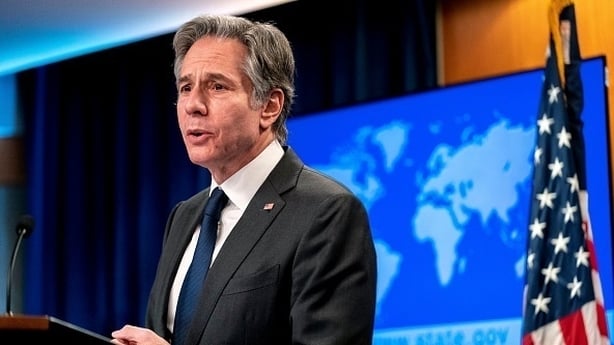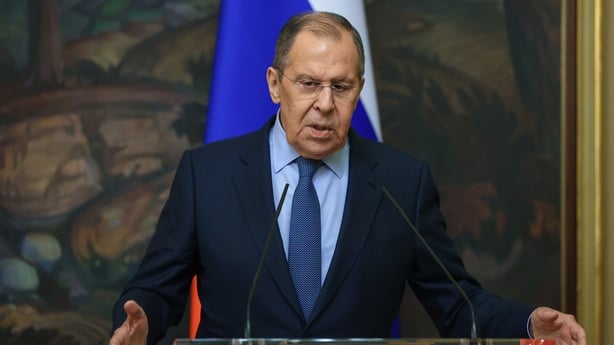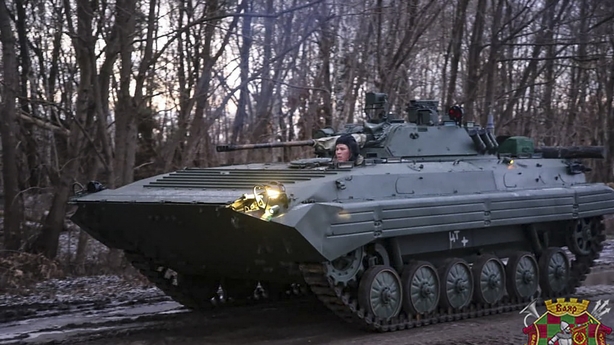The United States has raised the alarm on a potentially imminent Russian attack against Ukraine, ahead of a whirlwind diplomatic mission by Secretary of State Antony Blinken.
With tens of thousands of Russian troops already massed on Ukraine's borders, Mr Blinken flew to meet with the Ukrainians and European allies, ahead of talks with Russian Foreign Minister Sergei Lavrov on Friday.
US officials upped the threat level, saying that the slow-brewing crisis was reaching a dangerous new stage.
"We believe we're now at a stage where Russia could at any point launch an attack on Ukraine," White House Press Secretary Jen Psaki said.
"I would say that's more stark than we have been."
In an ominous new development, a senior State Department official said there is concern that draft constitutional reforms in Belarus, an authoritarian state closely allied to Moscow, could allow deployment of Russian nuclear weapons.

This came as Russian troops poured into the country for what were said to be training exercises but at levels that the US official said were far "beyond normal."
Russia insists it has no plans to invade Ukraine, where in 2014 it already seized one province and backed separatist rebels in another region.
However, Moscow's build-up of offensive weaponry and troops leaves little doubt that at least a potential assault is being prepared as a way to back the Kremlin's broader aim of preventing pro-Western Ukraine from leaving the Russian sphere of influence.
Among Russia's demands is a pledge from the NATO alliance that it never offer Ukraine membership - something NATO calls a non-starter.

Ms Psaki blamed the Russian leader, saying "President Putin has created this crisis" and warned again that unprecedented economic sanctions would follow a Russian attack against Ukraine.
"No option is off the table" when it comes to sanctions, she said, warning of an "extremely dangerous situation."
Ms Psaki stressed that this could include shelving the Nord Stream 2 natural gas pipeline from Russia to Germany.
Belarus military drills
Secretary of State Blinken will head to Berlin on Thursday for four-way talks with Britain, France and Germany.
They will discuss "joint efforts to deter further Russian aggression against Ukraine, including... readiness to impose massive consequences and severe economic costs on Russia," Price said in a statement.
Mr Blinken and Lavrov are then to meet in Geneva Friday, a US official said.
Ukraine, the US and European countries have raised deep concerns over Russia's troop build-up, despite repeated denials from Moscow that an invasion is planned.

However, Ukraine's Foreign Minister Dmytro Kuleba said on Tuesday that the situation was "under control, so please don't panic".
Kyiv has been at war with pro-Moscow separatists in Ukraine's east since 2014, when Russia annexed the Crimean peninsula after demonstrations ousted a Kremlin-aligned leader.
Adding to the tensions, Russia and Ukraine's neighbour Belarus on Tuesday launched snap military exercises.
The Belarusian defence ministry said it was hosting the drills because of the continuing "aggravation" of military tensions, including on its western and southern borders.
Ukraine borders Belarus to the south and NATO member Poland to the west.
Neither Moscow nor Minsk has disclosed the number of troops involved, but video published by Belarus showed military vehicles including tanks being unloaded from trains.
Warning from Turkey
NATO member Turkey also warned Moscow against invading Ukraine, with President Recep Tayyip Erdogan saying on Tuesday he intends to discuss rising tensions with Russian President Vladimir Putin.
Erdogan told reporters in Albania an invasion was not "a realistic option" because "Ukraine is a powerful country".
Turkey has supplied combat drones to Ukrainian forces, drawing fierce criticism from Moscow.
Russian negotiators met separately this month with delegations from the United States, NATO and the Organization for Security and Co-operation in Europe (OSCE), in meetings that ended inconclusively.
British Defence Secretary Ben Wallace announced in parliament on Monday that Britain is sending weapons to Ukraine.
The types of equipment being sent "are not strategic weapons and pose no threat to Russia," he said, describing them as "light, anti-armour, defensive weapon systems". Moscow labelled the shipments "extremely dangerous".

